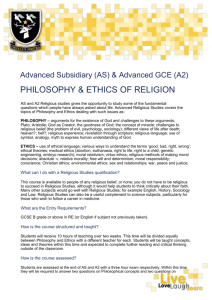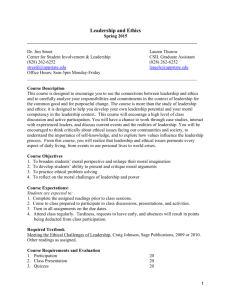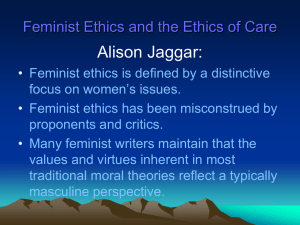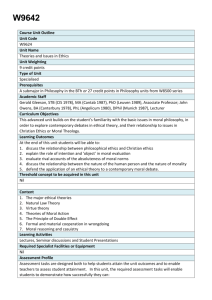PHIL 102 Introduction to Ethics - New WW2 Account Page
advertisement
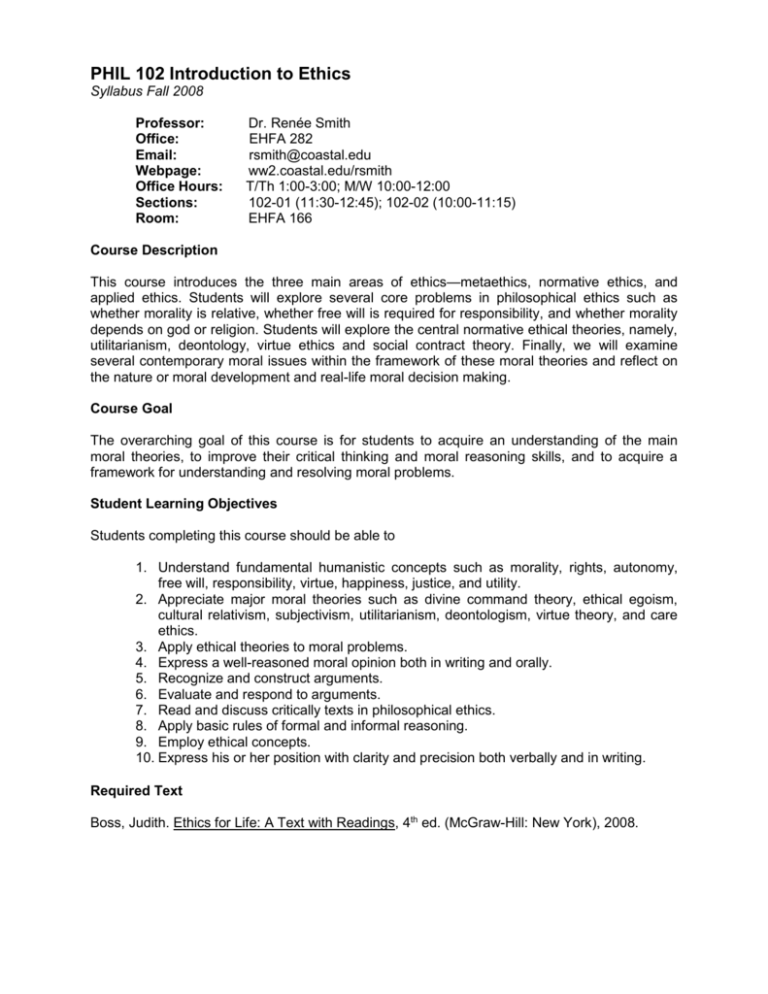
PHIL 102 Introduction to Ethics Syllabus Fall 2008 Professor: Office: Email: Webpage: Office Hours: Sections: Room: Dr. Renée Smith EHFA 282 rsmith@coastal.edu ww2.coastal.edu/rsmith T/Th 1:00-3:00; M/W 10:00-12:00 102-01 (11:30-12:45); 102-02 (10:00-11:15) EHFA 166 Course Description This course introduces the three main areas of ethics—metaethics, normative ethics, and applied ethics. Students will explore several core problems in philosophical ethics such as whether morality is relative, whether free will is required for responsibility, and whether morality depends on god or religion. Students will explore the central normative ethical theories, namely, utilitarianism, deontology, virtue ethics and social contract theory. Finally, we will examine several contemporary moral issues within the framework of these moral theories and reflect on the nature or moral development and real-life moral decision making. Course Goal The overarching goal of this course is for students to acquire an understanding of the main moral theories, to improve their critical thinking and moral reasoning skills, and to acquire a framework for understanding and resolving moral problems. Student Learning Objectives Students completing this course should be able to 1. Understand fundamental humanistic concepts such as morality, rights, autonomy, free will, responsibility, virtue, happiness, justice, and utility. 2. Appreciate major moral theories such as divine command theory, ethical egoism, cultural relativism, subjectivism, utilitarianism, deontologism, virtue theory, and care ethics. 3. Apply ethical theories to moral problems. 4. Express a well-reasoned moral opinion both in writing and orally. 5. Recognize and construct arguments. 6. Evaluate and respond to arguments. 7. Read and discuss critically texts in philosophical ethics. 8. Apply basic rules of formal and informal reasoning. 9. Employ ethical concepts. 10. Express his or her position with clarity and precision both verbally and in writing. Required Text Boss, Judith. Ethics for Life: A Text with Readings, 4th ed. (McGraw-Hill: New York), 2008. Assessment Criteria 1. Quizzes, Participation and Homework 20% There will be weekly homework assignments and/or quizzes in addition to the assigned reading. These assignments are meant to help you learn the material and prepare for in-class discussions and quizzes. Some homework will be collected, some will not. 2. Midterm Exam 20% This exam will test your understanding of the basic features, terms, characteristic, arguments for, and objections to the main ethical theories introduced in the reading and in class. 3. First Writing Assignment: TBA 20% Details of this assignment will be announced soon. You will be required to integrate and/or apply what you have learned so far about ethics to your experience/understanding of moral decision-making and development. 4. Second Writing Assignment: A Philosophy Paper 20% You will write a 4-5 page philosophy paper on an assigned topic. You will be asked to critically evaluate a theory, argument or position. Attendance on the day I talk about writing a philosophy appear is required, as is participation in in-class activities pertaining to writing and evaluating papers. 5. Final Exam 20% This exam will test your understanding of the basic features, terms, characteristic, arguments for, and objections to the main ethical theories introduced in the reading and in class. Additional Requirements Attendance and participation are required. You are permitted two absences to deal with illnesses and emergencies, please use them wisely. Absences beyond two will affect your grade as follows: 3 absences (lowered .5 letter grade), 4 absences (lowered 1 letter grade), 5 absences (lowered 1.5 letter grades), 6 absences (lowered 2 full letter grades), 7 absences (failure in the course). Cheating or plagiarism of any sort will result in failure in the course. Please refer to the Student Code of Conduct for details. There will be a number of opportunities to work in groups; however, the work you turn in must be uniquely yours unless otherwise specified. Respectful and charitable conduct and attitudes are required at all times. You are expected to come to class prepared, having done the assigned reading, reviewed your notes from the previous classes, and willing to participate in discussion. You are expected to work productively with your classmates on a number of small assignments and any group assignment outside of class. Each group member must do his fair share of the work. Perceived failures to satisfy this requirement should be reported to me immediately. Every assignment must be presented in a professional manner adhering to the rules of the English language, using formal style and tone, typed, stapled, and turned in on time. Late assignments will not be accepted except with my prior approval of for extreme extenuating circumstance, for instance, your house burns down. Communication with your classmates and me should be “professional,” informative, clear, and respectful. For example, your email correspondence should adhere to the grammatical rules of the English language; you should sign your real name, and specify which course you are taking. Understanding the requirements and learning the material in this course is ultimately your responsibility. If you need assistance with or clarification of anything pertaining to this course, you should talk to me as soon as possible.

